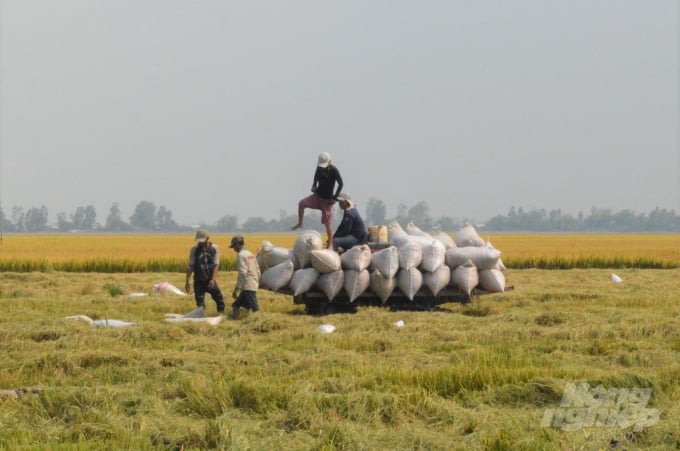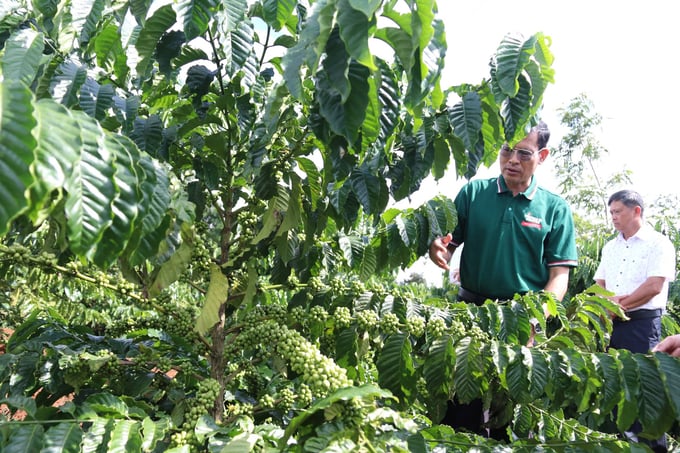May 22, 2025 | 01:56 GMT +7
May 22, 2025 | 01:56 GMT +7
Hotline: 0913.378.918
May 22, 2025 | 01:56 GMT +7
Hotline: 0913.378.918
This was a central theme highlighted by Deputy Minister of MARD, Tran Thanh Nam, during the recent preliminary conference addressing the implementation of the pilot project for establishing standardized agro-forestry material regions, aimed at both domestic consumption and export during the 2022–2025 period.
Over the course of five years, five standardized material regions have been successfully developed, showing significant growth in both size and quality. Several infrastructure and technical systems have been established within these regions, streamlining the delivery of raw materials from production areas to local processing plants.

Over the course of five years, five standardized material regions have been successfully developed, showing significant growth in both size and quality. Photo: VAN.
Numerous cooperatives have been newly formed and strengthened. Cooperative managers and members have received comprehensive training to enhance their capacity, integrating advanced accounting software and production management systems. A community agricultural extension system has also been established, offering technical consultations, market linkages, and support for cooperation development and credit access.
Local authorities have concentrated on the effective implementation of linkage projects along value chains, adopting advanced production processes, and supporting policies for rice farmland. They have successfully mobilized participation and financial contributions from cooperatives and enterprises.
To ensure continued progress, Deputy Minister Tran Thanh Nam tasked the Department of Economic Cooperation and Rural Development to act as the lead agency, coordinating with MARD’s affiliated units and the 13 participating provinces to complete the project. The Department will also facilitate training programs and consultancy services for cooperatives and their members, aiming to expand participation, consolidate operations, and enhance overall capacity and efficiency. Furthermore, it will collaborate with institutes and schools under the Ministry to research and organize vocational training for cooperatives, their members, and farmers, contributing to the development of material regions.
In addition, the Deputy Minister emphasized the importance of accelerating digital transformation and improving IT support for cooperatives. Research is also underway to establish an Agricultural Cooperative Association within these material regions, alongside the development of a comprehensive set of technical and economic criteria for standardized agro-forestry-fishery material regions.

Project to put many technical infrastructure works in raw material areas into use.
Regarding insurance and credit policies, Deputy Minister Tran Thanh Nam directed the Department to collaborate with Agribank, other banks, and credit institutions to pilot credit policies tied to agricultural insurance and value chains, particularly in the rice regions of the Mekong Delta and the coffee regions of the Central Highlands. A review of the credit needs of cooperatives and enterprises will soon be conducted to pilot these initiatives in these key areas.
As the managing body for investment, the Deputy Minister urged the Agricultural Project Management Board to expedite the construction and completion of infrastructure in the material regions, ensuring they are operational by the end of the year. The Board will also collaborate with relevant units within the Ministry and local authorities to assess the effectiveness of infrastructure investment projects supporting cooperatives from 2021–2025 and simultaneously develop proposals to extend these initiatives through 2026–2030.
Deputy Minister Tran Thanh Nam further tasked the National Agricultural Extension Center with enhancing the capacity of the agricultural extension system, supporting specialized agricultural extension teams in material region development, providing technical advice, fostering market linkages, and improving access to technology and credit. He also recommended piloting the participation of community agricultural extension groups in cooperative organization efforts.
Additional units such as the Department of Crop Production, Plant Protection, the School of Public Policy and Rural Development, as well as institutes and universities, are expected to support training programs and capacity-building efforts for cooperatives. These units will also work to expand the scale and effectiveness of operations, assist in the issuance of production area codes and packaging facility certifications, and support both domestic and export markets. Moreover, they will collaborate to organize the 970 Forum, which aims to connect markets, promote trade, and showcase products from the material regions.

A number of credit models will be piloted according to the chain linkage in the rice material areas of the Mekong Delta and the coffee areas of the Central Highlands. Photo: VAN.
The Deputy Minister urged the 13 participating provinces to allocate necessary funds and coordinate efforts in project implementation, provide legal and infrastructural support, complete infrastructure in the material regions, and offer training and assistance in issuing production area codes and enabling product traceability.
The pilot project to establish standardized agricultural and forestry material regions for domestic consumption and export during the 2022–2025 period involves 13 provinces, namely Hoa Binh, Son La, Quang Tri, Thua Thien Hue, Gia Lai, Dak Lak, Kon Tum, Dak Nong, An Giang, Kien Giang, Dong Thap, Tien Giang, and Long An.
Translated by Linh Linh
![Reducing emissions from rice fields: [2] Farmers’ commitment to the soil](https://t.ex-cdn.com/nongnghiepmoitruong.vn/608w/files/news/2025/05/05/dsc08881jpg-nongnghiep-140632.jpg)
(VAN) Clean rice cultivation model in Thuong Tan commune, Bac Tan Uyen district, is assisting local residents in achieving sustainable agriculture by substantially reducing costs, increasing productivity, and protecting the environment.

(VAN) At the conference to disseminate Resolution No. 68, AgriS introduced its digital agricultural ecosystem and reaffirmed its commitment to accompanying the Government in promoting private sector development and sustainable agriculture.

(VAN) 'Blue Ocean - Blue Foods' initiative is designed to restore marine ecosystems and establish sustainable livelihoods for local communities by cultivating a minimum of 1,000 hectares of cottonii seaweed in the first three years.
/2025/05/21/4642-3-112707_603.jpg)
(VAN) The V-SCOPE project has made direct contributions to three out of six pillars of the Comprehensive Strategic Partnership between Vietnam and Australia.

(VAN) Facing the threat of rabies spreading to the community, Gia Lai province urgently carries out measures to vaccinate dogs and cats on a large scale.

(VAN) Disease-free livestock farming not only protects livestock herds but also stabilizes production and livelihoods for many farmers in Tuyen Quang.

(VAN) Japan's grant aid project contributes to capacity building, promoting organic agricultural production, and fostering sustainable community development in Dong Thap province.